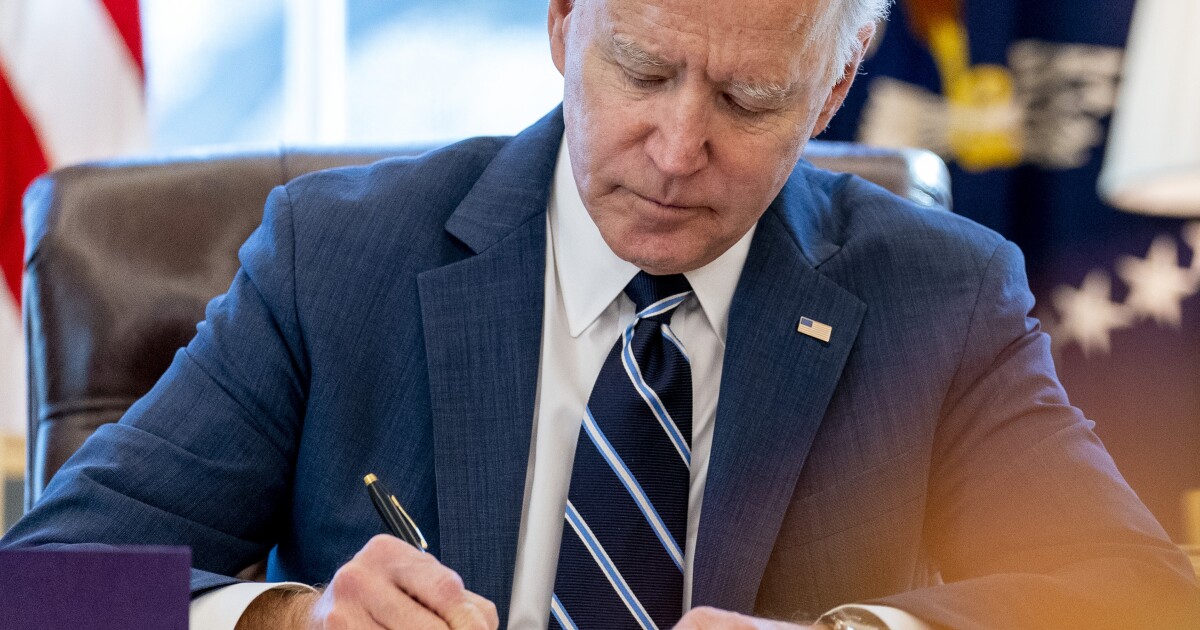

President Joe Biden entered the presidency with ambitious climate and environmental goals, making promises on the campaign trail to deliver a clean energy economy.
After entering office, he put forth climate and clean energy plans with goals of accelerating the US energy transition, including making two-thirds of new passenger vehicles all-electric by 2032.
However, the president has faltered on multiple vows, causing leaders and the public to question the viability of his green agenda.
Early campaign pledges and breaking promises
When Biden entered the White House, climate change was among his top four priorities, along with COVID-19, racism, and the economy.
“The United States produces the cleanest energy in the world, yet each action this administration takes seeks to increase our reliance on energy from foreign adversaries with lower environmental standards,” Sen. Cynthia Lummis (R-WY) of the Environment and Public Works Committee told the Washington Examiner.
One of the most notable failures could be Biden’s lack of unifying Democrats behind his Build Back Better bill, which he campaigned on the contents of.
“We can live up to our responsibilities, meet the challenges of a world at risk of a climate catastrophe, build more climate-resilient communities, put millions of skilled workers on the job, and make life markedly better and safer for the American people all at once,” Biden said on his campaign site in 2020.
The climate portion of Build Back Better contained around $555 billion for environmental policies and $320 billion in tax incentives for solar, wind, and nuclear power affiliates. The legislation never passed in its original form. West Virginia Sen. Joe Manchin drifted from his Democratic Party and refused to support the bill.
After months of negotiation, the Inflation Reduction Act of 2022 was introduced, investing $369 billion in climate provisions and environmental justice reforms with Manchin’s support.
The significant climate legislation lacks what the Build Back Better bill detailed in terms of climate provisions, but it still provided funding to multiple green programs and incentives the adoption of a clean energy economy.
“The United States must lead the world to take on the existential threat we face—climate change,” Biden wrote in Foreign Affairs Magazine in 2020. “If we don’t get this right, nothing else will matter.”
The reality after two years in office has differed from his climate promises during the campaign.
“President Biden’s radical climate agenda caters to environmental extremists and is incredibly threatening to the livelihoods of people in the West, particularly in my home state of Wyoming,” Lummis said.
Biden campaigned in 2021 on promises to end new drilling on federal lands, moving the nation away from fossil fuels.
“Number one, no more subsidies for fossil fuel industry,” Biden said during a Democratic presidential primary debate on CNN in March 2020. “No more drilling on federal lands. No more drilling, including offshore. No ability for the oil industry to continue to drill, period, ends, number one.”
Biden approved ConocoPhillips’s Willow project in March, the biggest oil project ever proposed on U.S. soil. This hefty $8 billion project in the wilderness of northern Alaska will extract 600 million barrels of oil from federal land.
Multiple Democratic leaders and supporters voiced their concerns about the project. Protests and opposition across the country arose as well.
Reps. Jared Huffman (D-CA), Alexandria Ocasio-Cortez (D-NY), Raúl M. Grijalva (D-AZ), and Sen. Ed Markey (D-MA), who all serve on various environmental committees, issued a joint statement on Biden’s decision.
“The Biden administration has committed to fighting climate change and advancing environmental justice—today’s decision to approve the Willow project fails to live up to those promises,” the statement said.
Successful follow-throughs
On his first day in office, Biden signed the United States back into the Paris Agreement, after running on promises to reverse former President Donald Trump’s 2017 decision to pull the nation from the Paris climate deal.
“I will rejoin the Paris climate agreement on day one of a Biden administration and then convene a summit of the world’s major carbon emitters, rallying nations to raise their ambitions and push progress further and faster,” Biden said in 2020.
Biden followed through on his campaign pledge on January 20, signing the executive order to reenter the international effort to curtail global warming.
Biden also upheld his electric vehicle policies — his campaign set out to spend $400 billion in public investment to move the US towards clean energy — with measures for revolutionary battery technology, as reported in 2020.
“President Biden’s executive order on EVs, which require minerals mined in the Democratic Republic of the Congo and China, enhances our reliance on our adversaries that have weak environmental regulations,” Lummis said.
Earlier in April, the Biden administration revealed strict rules to accelerate the country’s transition to electric vehicles. In a suitability plan, the President outlined his goals of having 100 percent of the country’s federal fleet using medium and heavy-duty ZEVs by 2035.
“Many of these minerals could be mined right here in the United States, where there are high standards that protect the environment and workers,” Lummis said, referring to the mining and processing of minerals needed to produce EV batteries. “It makes no sense that President Biden is unwilling to take steps to speed up domestic energy and mineral production here at home.”
What is in the works?
Most recently, the Biden administration announced new investments to conserve the Colorado River after the vital source of water and electricity for the West has been facing a historic drought.
“I’m glad to see the agreement reached on the Colorado River was made at the state level; however, the upper basin states, including Wyoming, have not yet endorsed this plan as they are still reviewing it,” Lummis said. “I am optimistic that the seven states can continue to lead on this issue.”
Eight agreements in the Phoenix and Tucson, Arizona, areas are aimed at protecting Lake Mead’s 393,000-acre feet of water, the largest reservoir of the Colorado River.
One of the agreements impacts areas across state lines, with California, Arizona, and Nevada promising to conserve 3 million acre-feet of water until 2026, which is around 13% of the state’s total allocation from the Colorado River.
“Today’s announcement is a testament to the Biden-Harris administration’s commitment to working with states, Tribes, and communities throughout the West to find consensus solutions in the face of climate change and sustained drought,” Interior Secretary Deb Haaland said in a statement.
Senate Republicans have managed to repeal a handful of Biden’s climate policies, most recently overturning the newly implemented Environmental Protection Agency’s (EPA) Heavy Duty Truck Rule.
“Through the Congressional Review Act, my colleagues and I have successfully overturned several executive orders related to Biden’s radical Green New Deal agenda,” Lummis said.
The House voted against the rule, which sought to update clean air standards for heavy-duty trucks. The regulation would tighten emission limits for nitrogen oxide emitted from commercial trucks beginning in the 2027 model year, hoping to have a majority of large trucks be low or zero emission by 2045.
Sen. Manchin, who has distanced himself from the Democratic party on polarizing issues, was the only Blue party member to vote to repeal Biden’s rule.
“When our country faces record-high inflation and vulnerable supply chains, we cannot let the EPA continue to seize unrestrained power and create regulations that devastate our economy,” Manchin said in a press statement.
The White House said Biden will veto the bill against the EPA to ensure the policy passes in a statement last month. It will be the fourth veto of Biden’s term.
“Over time, the final rule will prevent hundreds of premature deaths, thousands of childhood asthma cases, and millions of lost school days every year for the tens of millions of Americans who live, work, and go to school near roadways with high truck volume including truck freight routes,” Biden stated.
“This year, we will see additional CRAs, and the Republican members of the committee will continue to push back on the climate agenda that negatively impacts hardworking Americans,” Lummis said.
Biden was once reportedly considering declaring a national climate emergency, facing pressure from climate advocates and progressive lawmakers.
CLICK HERE TO READ MORE FROM THE WASHINGTON EXAMINER
Several Democrats urged Biden to declare “a climate emergency” and unlock “the full tools at your disposal to address this crisis,” in a letter sent in October.
“Declaring a climate emergency would have unlocked new executive powers for President Biden so that he could bypass Congress and the will of the voters,” Lummis said. “I believe President Biden realized how unpopular this idea was, and still is, which is why he hasn’t declared an emergency.”







